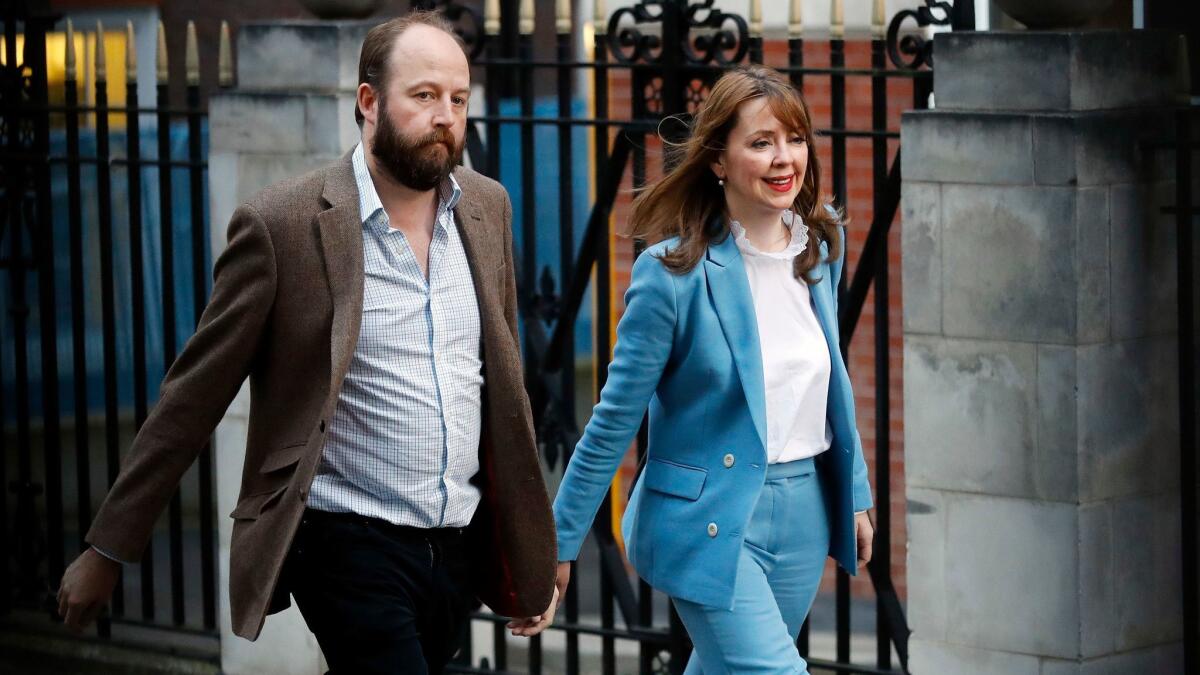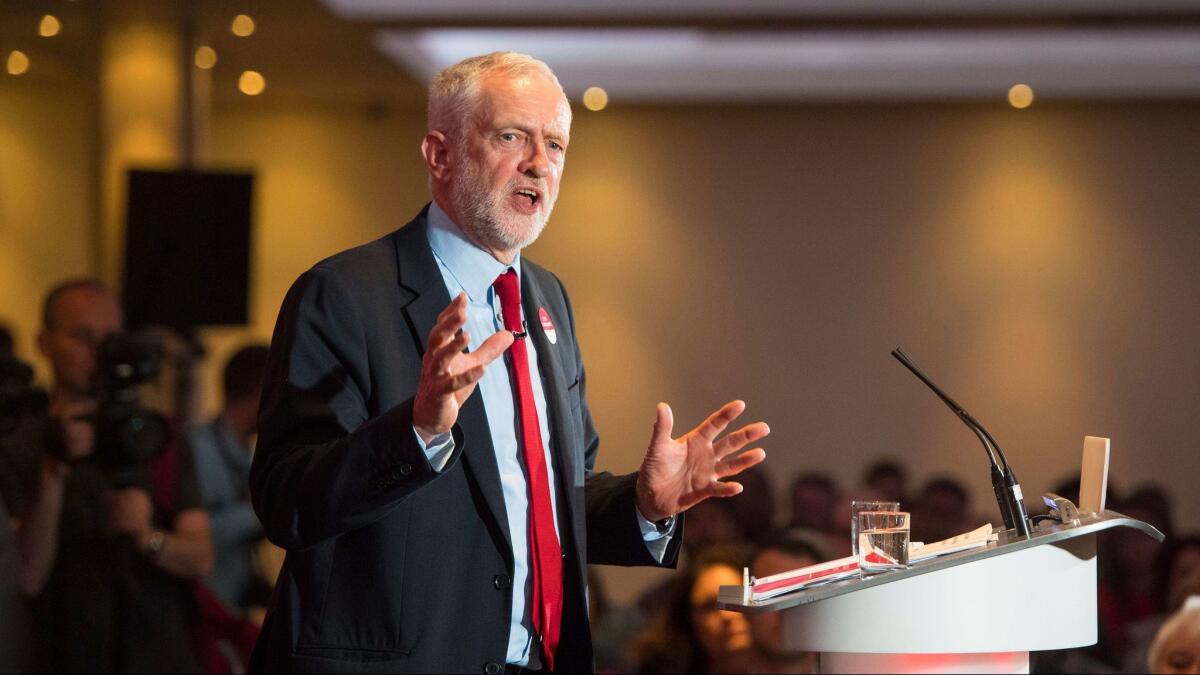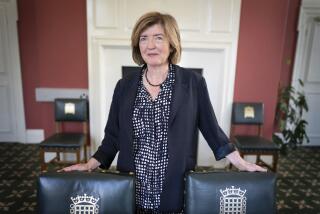British prime minister’s top aides resign after election fiasco

- Share via
Reporting from LONDON — Prime Minister Theresa May’s two closest aides resigned Saturday amid the fallout over her Conservative Party’s disastrous general election campaign.
Chiefs of Staff Nick Timothy and Fiona Hill became the first high-profile members of May’s core team to step down as the party worked out a way to regroup following a humiliating election that saw its majority wiped out.
“The general election result was a huge disappointment,” Timothy said in a statement posted on the Conservative Home website. “One can speculate about the reasons for this, but the simple truth is that Britain is a divided country.”
The pair were two of the prime minister’s top advisors and therefore many see them as responsible for her failure to connect with voters and win their support.
In his statement, Timothy made particular mention of a manifesto pledge to change the way older people pay for their social care, which is seen as a crucial turning point in the campaign where the tide started to turn toward the main opposition Labor Party.
It was dubbed a “dementia tax” by critics and so widely criticized that May was forced to modify her proposals.
Many saw her change of heart as a U-turn, and it alienated some of the Conservative Party’s key older voters.
Timothy said he stood by the entire manifesto, which he still saw as “an honest and strong program for government” but also took responsibility for its shortcomings.
“I regret the decision not to include in the manifesto a ceiling as well as a floor in our proposal to help meet the increasing cost of social care,” he wrote.
But he said the key reason for the Conservatives’ failure to win an overall majority in Thursday’s election was an unexpected surge in Labor support, under the leadership of Jeremy Corbyn.
The Conservative Party won 318 seats in the election, eight short of the number it needed to secure a majority in Parliament and 13 fewer than it had going into the election.
Meanwhile, the Labor Party far exceeded expectations by securing 262 seats, an increase of 30.
When May called the election in April, all indications were that she was going to consolidate her majority — with some polls predicting the Conservatives could end up with a 100-seat majority.
But the campaign failed to inspire, May’s performance was described as stilted and lackluster and key manifesto pledges were roundly criticized.
She needed to broaden her circle of advisors. She needed to have a few gray hairs in there who had been around the block a bit in politics.
— Katie Perrior, former Downing Street director of communications
Attempts to make the campaign about tough upcoming “Brexit” negotiations to pull out of the European Union and the prime minister’s ability to provide strong leadership during a time of uncertainty also fell flat as the Labor camp stirred passions with talk of increasing healthcare funding and ending university tuition fees, along with the need to stop years of the Conservatives’ austerity cuts.
Corbyn’s message also crucially appealed to younger voters who are overwhelming opposed to Brexit and voted in unexpectedly high numbers.
“Many [British citizens] are tired of austerity, many remain frustrated or angry about Brexit, and many younger people feel they lack the opportunities enjoyed by their parents’ generation,” Timothy said in his statement.
Two terrorist attacks in the space of a few weeks also temporarily halted campaigning and called into question May’s tenure as home secretary where she presided over the elimination of 20,000 police jobs.
Despite immediate calls for May to resign, the prime minister appeared defiant on Friday and said the country needed “certainty” and would form a government with the support of Ireland’s Democratic Unionist Party, or DUP, which won 10 seats.
But there were reports that Conservative lawmakers were threatening to challenge May’s leadership as soon as Monday if she did not remove her two closest advisors, who followed her from the Home Office where she worked until becoming prime minister in 2016.
Former Culture Minister Ed Vaizey told the BBC that Tory legislators were actively discussing a new leader using the WhatsApp messaging service.
Even sections of the British press that had ardently backed the prime minister before the election soured in their attitude toward her.
“Tories turn on Theresa,” the Daily Mail headline said Saturday. “May stares into the abyss,” the Times of London wrote.
Former Downing Street director of communications, Katie Perrior, said the atmosphere within May’s camp had been “pretty toxic” with Timothy and Hill at the helm. Staff members felt they could not speak freely when the pair was around, she said.
“She needed to broaden her circle of advisors,” Perrior said in a BBC radio interview. “She needed to have a few gray hairs in there who had been around the block a bit in politics.”
May’s new chief of staff was announced on Saturday as former Conservative Party Housing Minister Gavin Barwell.

The resignations will probably buy May some time but many doubt she should, or can, last long-term.
Deputy Labor leader Tom Watson said on Twitter on Saturday that although May’s key advisors had taken the fall, she alone “is the one responsible for her own defeat.”
May’s immediate concern is to solidify a deal with the DUP ahead of the Queen’s Speech on June 19, when she will set out the new government’s agenda for the next parliamentary term.
That is also the day that Brexit negotiations with the EU are scheduled to begin. But any deal she strikes with the DUP is likely to cause tensions, especially given the party’s socially conservative stance on issues like same-sex marriage and abortion.
Northern Ireland is the only place in the U.K. where same-sex marriage is still illegal.
Ruth Davidson, leader of the Scottish Conservatives, who is a lesbian and due to be married to her partner, said there are obviously areas of social policy where the two parties “differ hugely.”
But she had sought and received “a categoric assurance” from the prime minister that there would be no rollback of LGBT rights, as well as women’s rights.
A deal with the DUP also has the potential to disrupt the delicate balance between the British loyalists and Irish nationalists at a particularly sensitive time.
Britain’s split from the rest of the European Union could see the introduction of a new land border between Northern Ireland, which will remain part of the U.K., and mainland Ireland, which will stay within the EU post-Brexit.
Negotiations for a new power-sharing government in Northern Ireland are also due to restart soon, after breaking down this year, and London will not want to be accused of picking sides.
UPDATES:
3:35: This article was updated with throughout with additional staff reporting.
Noon: This article was updated with staff reporting.
This article was originally published at 9:55 a.m.
More to Read
Sign up for Essential California
The most important California stories and recommendations in your inbox every morning.
You may occasionally receive promotional content from the Los Angeles Times.










